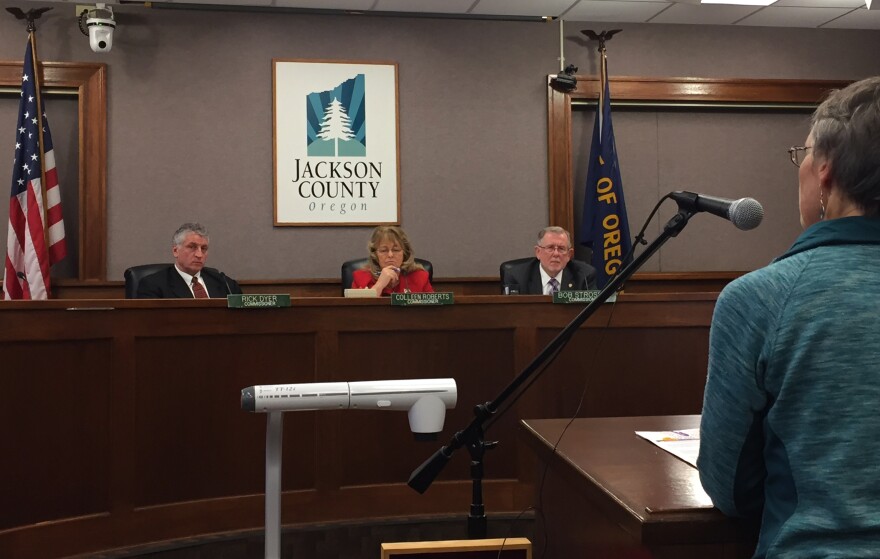The decision to vote on a new Jackson County jail is one step closer to the May ballot. That’s after county commissioners heard public comment yesterday on everything from access to mental health treatment to the tax increase to pay for it.
The meeting on Wednesday morning was one of the last steps in a years-long process for Sheriff Nate Sickler to get the jail proposal from an idea to voters in the next primary election.
“We have a decade of grand jury recommendations that recommend more staffing, to more mental health, to a new building, better designed and larger,” Sickler said, “This proposal will address all of those issues.”
Sickler said he’s gotten three past recommendations from the National Institute of Corrections saying the current jail, which opened in 1981, is too small and too old.
“You’d really have to disregard all of those assessments to say that this isn’t a matter that the voters should decide on.”
A new jail would increase from the current number of 315 beds to almost 800 beds. It would cost tax payers around $171 million to build, which would come from a county property tax increase.
That property tax rate to fund the new jail would be $87.19 per $100,000 of assessed value. The median home value in Medford is $293,000 according to Zillow, which translates to a $255 tax increase per year. The median home value in Ashland is approximately $463,000, which translates to an ongoing cost of $403 per year in jail construction and operation.
There’s been lots of opposition to the jail proposal over the past year. But on Wednesday, while nearly all public commenters said the current jail is outdated, almost everyone was opposed to a new jail.
The majority of concerns focused people with mental illnesses being incarcerated and criticism that alternative criminal justice programs designed to keep people out of jail hadn’t been fully considered.
“I’m concerned that the process that led to this jail proposal is a process that began with a conclusion and has worked backwards to try to build support for this jail only proposal,” said Jason Clark, who is a city counselor from the City of Talent.
Talent was the only city in Jackson County that voted not to be part of the jail service district, the area property taxes would get collected from to fund the jail.
A handful of residents did speak in support of the jail, including William Mansfield from Medford. He was concerned that when people charged with crimes aren’t held in jail, they revictimize residents.
“We are not going to solve the problem by turning violators out to violate again,” Mansfield said.
After two hours of public comments, County Commissioner Rick Dyer said his mind was made up. He said a bigger jail will have an overall positive effect on the county.
“This particular proposal addresses some of these mental health issues but this is not solely a mental health question,” Dyer said, “This is a jail capacity question.”
Dyer said for him, it does address “threshold questions” about whether a new jail is a possible solution to problems like releasing inmates who then don’t show up at court, inefficient use of public money and creating a way to deter crime.
“Those are the threshold questions that determine whether this board, in my opinion, should refer this to the voters.”
Commissioner Bob Strosser had a more nuanced reaction, which he said had come from hearing from other experts like clinicians, judges and other people who work in the courts.
“They all talk about a jail as not just a jail but as a part of a system and the system isn’t working well,” Strosser said. “In fact, it’s somewhat digesting itself by recycling people before they’ve ever stabilized and gotten treatment.”
The final county commission hearing will happen on Feb. 26. Commissioners will then decide whether to send the decision to voters in the May, 2020 primary election.




